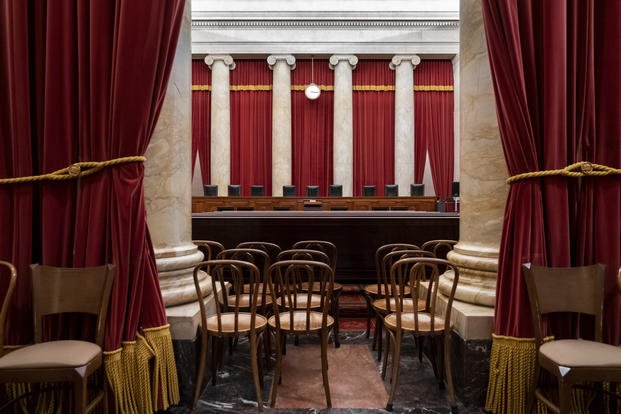The Supreme Court heard arguments Wednesday in a case that could determine how the U.S. Court of Appeals for Veterans Claims considers decisions on veterans’ requests for disability compensation.
For more than an hour Wednesday, the justices peppered attorneys for the plaintiffs and the federal government on whether the Veterans Court is obligated to determine whether the Veterans Board of Appeals — the VA’s deciding panel on denied claims — must always consider, when there is equal evidence supporting and against a claim, the VA decided in favor of the veteran.
The Veterans Court was created in 1988 to review decisions by the board and required the court to ensure that veterans receive the benefit of the doubt in close cases.
Read Next: Military Voters, Advocates Worry Votes Won’t Count Amid GOP Election Challenges
Following complaints from veterans groups that the court was too deferential to VA decisions, Congress in 2002 crafted new legislation that instructed the court to “take due account” of whether the board actually favored veterans in such cases.
In the case, Bufkin v. McDonough, attorney Melanie Bostwick said Congress wrote the law to ensure that veterans received a thorough review.
“The benefit of the doubt statute … has two mandatory requirements. It requires VA to consider all medical and lay evidence and information relevant to the issue, and then it requires if there is an approximate balance of positive and negative evidence on any issue that the veteran receives the benefit of the doubt,” Bostwick argued Wednesday.
The federal government, represented by the Assistant to the Solicitor General Sopan Joshi, argued that Congress, in the 2002 law, only sought to remind the board of its obligation to give veterans the benefit of the doubt, and the court is limited only to review the board’s decision for error.
“If it’s a [new] review, that means that in every case … the appellate court is going to … review the entire record, assign weight, balance things,” Joshi said. “Appellate courts are not well-suited to doing this.”
Veterans Joshua Bufkin, who served in the Air Force from 2005 to 2006, and Norman Thornton, a former Army soldier who served from 1988 to 1991, filed suit against the VA, saying the board, and later the court, did not follow the law.
Both plaintiffs applied for benefits but were denied repeatedly by adjudicators and on appeal. Bufkin served for six months before receiving a hardship discharge because of family issues. He later filed a claim for post-traumatic stress disorder, saying he was traumatized by his wife’s threats to kill herself if he didn’t leave the military and pressure by the Air Force that he leave the service.
VA medical assessments of Bufkin’s case conflicted, with physicians disagreeing on whether he had PTSD and, if so, was it service-connected.
In Thornton’s case, the VA awarded the Desert Storm veteran a 50% disability rating and said his symptoms did not qualify him for a higher rating, although one assessment determined that he had at least one measure that may have qualified him for a 70% rating.
While the justices were considering the legal questions of the case and whether the VA was following Congress’s wishes, several asked questions about the effects a different ruling would have on the plaintiffs.
“I just don’t understand exactly what [Mr. Thornton] stands to gain because of his unemployability; wasn’t he given complete disability? So what further relief could he get if he wins before us?” asked Justice Amy Coney Barrett.
Bostwick said that under his circumstances, Thornton is subject to continued review of the unemployability benefit and that a different ruling would remove that uncertainty and maybe entitle him to “special monthly compensation” above the 100% disability.
Joshi noted that Bufkin presented medical opinions saying he suffered from PTSD and others that say he didn’t, and later examinations found that his PTSD diagnosis did not measure up against the standards set in the diagnostic manual.
“What constitutes an approximate balance, how far away the scale should be?” Joshi asked.
The court is expected to release its decision next spring. Attorneys agreed that something must be done to provide guidance to the Veterans Court, which handled 1,100 cases last year.
“I think it is going to be a big deal,” Joshi said. “I think the vast majority of cases that get appealed to the Veterans Court are raising essentially factual challenges to findings that there’s no present disability or no in-service connection or no causation.”
“Our view of the statute is that this is something the Veterans Court has to do in every case,” Bostwick said of the benefit-of-the-doubt consideration.
Related: Supreme Court Hears Arguments on Education Entitlements Under Different GI Bills
Story Continues
Read the full article here

